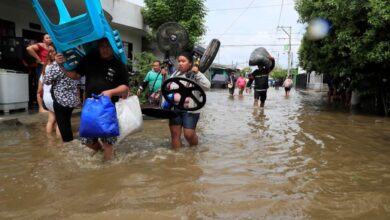End the week informed with the main political and economic news from the entire region.

These are some of the most relevant news of this week. Photo: Freepik
LatinAmerican Post | Santiago Gómez Hernández
Listen to this article
Leer en español: Caída en la economía, avance de la vacunación y más noticias políticas de la semana
Mutiny in Paraguayan prison
On Tuesday, a riot in the Tacumbú prison, the largest in Paraguay, left at least 7 people dead among those arrested. As has been known so far, the dead belong to the fire started by the prisoners, various hypotheses of the motive are handled, between covering up evidence or protesting the transfer of a prisoner.
#EFETV | Confirman un séptimo muerto en un motín en la hacinada cárcel de Asunción (Paraguay). https://t.co/60FdZ0saN0 pic.twitter.com/s3G3gUWTW2
— EFE Noticias (@EFEnoticias) February 17, 2021
2020 leaves poor economic results in the region
The economic results of the year of the pandemic are beginning to be known. According to the consolidated data of some countries, Brazil was the country that best resisted the crisis and registered only a 4% decline, while the one with the worst record was Peru, with a fall of 11.1%. Chile (6%), Colombia (6.8%), and Mexico (8.5%) occupy the middle of the list
The vaccination process continues unevenly in Latin America
While countries like Chile have achieved vaccinations for about 10,000 people in a single day, on Wednesday, the first day of vaccination in Colombia, only 18 people were vaccinated. According to One World Data monitoring, Chile is the first Latin American on this list with 12 vaccinated per 100 inhabitants, then Brazil with two citizens vaccinated per 100. At the end of the list, Mexico is close to 1 per 100. For its part, the first batch of AstraZeneca's vaccine arrived in Argentina, which will join the vaccination with the Russian Sputnik V that has been used since December.
En casi dos semanas, más de 2 millones de personas han sido vacunadas contra el #COVID_19 y, en promedio, se han hecho 200.000 inoculaciones por día.
El gran trabajo del personal de salud y municipios nos posiciona como uno de los países con mayor vacunación a nivel mundial. pic.twitter.com/9rxKGnTCs1— Alberto Dougnac (@AlbertoDougnac) February 16, 2021
Also read: New political crisis in Peru would give a new turn to the elections
Protests in Spain over the imprisonment of antimonarchical rapper
Spain is experiencing several nights of protests after the police arrested rapper Pablo Hasel convicted of tweeting against Juan Carlos I. Disturbances concentrated in Barcelona and Madrid have left at least 15 people arrested and 33 injured. The Catalan rapper had been condemned by the National High Court for "exalting terrorism and insults and slander." In the artist's lyrics, you can hear phrases such as "gangster boss or" tyrant drunkard "against the emeritus king. Hasel also has a criminal record, since in 2017 he was convicted of resistance and disobedience to the law, and in 2018, for trespassing, in addition to various fines for attacks and threats in his songs against various politicians.
Golpean fuertemente la cabeza de un policía en el suelo y luego le lanzan un patinete. #PabloHasel. pic.twitter.com/TD4mLl2zyK
— Alerta Zeta – Sucesos (@AlertaZeta) February 18, 2021
Colombia: False positives were more than 6000
The Colombian case of extrajudicial executions by the Armed Forces of civilians or people outside the armed conflict were at least 6,402 and not 2,248, according to the Special Justice for Peace (JEP).
La JEP revela su estrategia de priorización dentro del #Caso03, conocido como el de "falsos positivos".
Por lo menos 6.402 personas fueron muertas ilegítimamente para ser presentadas como bajas en combate en todo el territorio nacional entre 2002 y 2008. pic.twitter.com/Yi7HRiDBWi— Jurisdicción Especial para la Paz (@JEP_Colombia) February 18, 2021
These deaths were carried out by members of the Colombian Army (mostly) and were later presented as combat casualties against armed groups. The perpetrators sought a series of benefits (permits) for increasing the numbers of rebels killed ("positives"). Some remembered cases were young people captured from the poor areas and slums of Bogotá and neighboring municipalities, and through job promises they were transported to rural areas with great rebel activity, to later be assassinated and presented as guerrillas.





